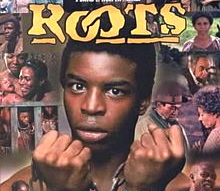

And thanks to Roots, audiences were finally seeing these stories and understanding an important, horrific part of American history. With Roots, I worked my head off to research everything and still a lot of the book is fiction." While the details of Kinte's story may not be verifiable, the slave experience was real and significant. In an interview transcribed by the Alex Haley Roots Foundation, writer Lawrence Grobel asked Haley if he prefers to describe Roots with a different word than "novel," to which Haley replied, "Faction. The New York Post also reports that many of the dates in Roots seem to be wrong, and that the BBC found a tape of Haley interviewing the historian of his ancestors' African home, which depicts Gambian officials and Haley correcting the man's story to better fit the author's. The network reports that genealogists have found inconsistencies in Haley’s family tree, like the fact that records suggest the real Kunta Kinte died five years before the birth of Haley’s great, great, great grandmother, Kizzy, though Roots portrays Kizzy as Kinte's daughter. However, the lineage of Kinte's family may have been inaccurate in Roots, according to CNN. Kinte was a slave captured in Gambia and brought to the United States where he refused to accept his new name, "Toby," or having his freedom taken from him.Ĭlick Here to Buy: Roots: The Saga of an American Family, $6, Amazon As the story of Roots goes, Haley was the great, great, great, great-grandson of Kunta Kinte, the book's protagonist and patriarch. Though the book was presented as a factual account of Haley's own family history with some "fictional embellishments," experts soon found inconsistencies between some of its claims and historical documents. Since the miniseries is an adaptation, the question of Roots' accuracy falls to its source material, and as explained by the New York Post, Haley's book has been at the center of controversy over its historical claims for years. Considering the dialogue started by the original miniseries and its legacy, new audiences may be curious about the details of the story and want to know, how historically accurate is Roots?

And, now, History is reviving the miniseries nearly 40 years later with a remake airing across three networks, History, A&E, and Lifetime, beginning on Monday, May 30.

Based on the Pulitzer Prize-winning novel of the same name by Alex Haley, it told the story of an African American family from colonialism to reconstruction and literally brought the discussion of the history of race in America into viewers' living rooms. In 1977, the groundbreaking miniseries Roots captivated millions of viewers.


 0 kommentar(er)
0 kommentar(er)
